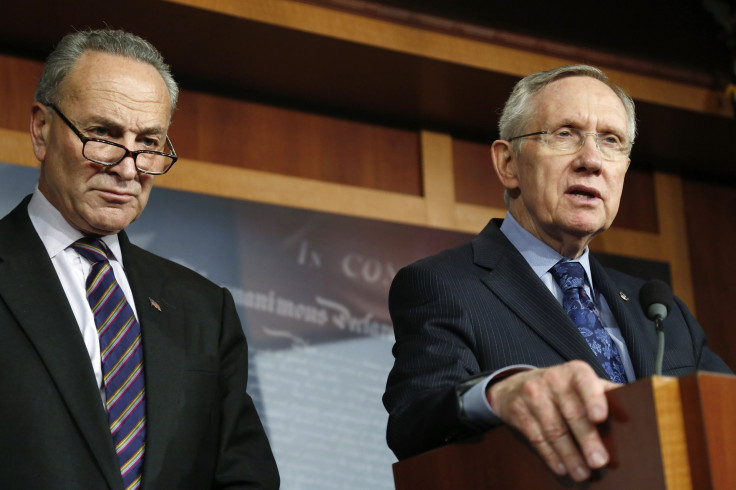Debt Ceiling 2013: Reid Offers McConnell A Deal

U.S. Senate leaders are reportedly considering a deal that would end the government shutdown and extend the debt ceiling.
According to Politico, Senate Majority Leader Harry Reid, D-Nev., has made an offer to Senate Minority Leader Mitch McConnell, R-Ky. - the first sign of breakthrough in a gridlock that has dragged on for almost two weeks. The deadline to increase the debt limit is Oct. 17, the U.S. Treasury has warned. At/near that date the U.S. government will have exhausted its lending authority; and because the federal government can not meet all bills due with cash on hand, a default would occur - perphaps at early as Oct. 17 and certainly by Nov. 5, if the debt ceiling is not raised.
Reid’s proposal, according to Politico, includes extending the debt ceiling for six to nine months, and would fund the government at $986 billion until December. The measure will also establish some sort of framework for negotiating with the White House on those haunting, automatic, across-the-board spending cuts known as sequestration. And delaying the medical device tax -- a 2.3 percent levy on sale of taxable medical devices like pacemakers as required by the Affordable Care Act -- isn’t off the table.
USA Today also reported that Obama and Vice President Joe Biden will be meeting with Reid, McConnell and House Speaker John Boehner, R-Ohio, and House Minority Leader Nancy Pelosi, D-Calif., at 3 p.m. EDT Monday at the White House.
Here’s what Reid told NBC of the breakthrough:
Reid leaves McConnell's office, says "we're going to continue to work on it, it's not done yet." #shutdown
- Frank Thorp V (@frankthorpNBC) October 14, 2013
Earlier that day, Sen. Joe Manchin, D-W.Va., told the media that a deal was about 70 percent to 80 percent complete, but that some specifics needed working out.
More than 800,000 federal workers were furloughed on Oct. 1 because of a funding lapse for which Democrats and the public blamed Republicans; Republicans reject the charge. Some national attractions, such as nationakl parks, have shuttered because of the failure of Congress to agree on a budget.
At its core, the battle Republicans are fighting is to limit government spending - the party's fiscal goal for the year. However, after the Senate finally passed a budget, the bill never went to a conference committee with the House's version, with lawmakers finding themselves at an impasse when the House GOP decided to tie funding of the entire government to its ongoing quest to repeal or defund Obamacare, the nation's universal health care system. Ironically, the most ardent proponent of this approach was a senator, not a representative: Sen. Ted Cruz, R-Texas, who demanded fairness for individual Americans, whom he said deserved at least a one-year delay from the health care law's requirement to purchase health insurance; Cruz argued that provision was only fair, given that the Obama administration granted businesses a one-year exemption on the employee insurance requirement.
Further, after the two sides failed to agree on a budget during the past two weeks, the crisis bumped up against the Oct. 17 debt ceiling date. President Obama has reiterated that he would not negotiate a budget with Republicans until the goverment was re-opened and the debt ceiling raised. Even so, the president eventually met with Republican leaders to find a way out of the fiscal impasse, but there was no progress. However, Obama added that he was open to a short-term debt limit deal; House Speaker John Boehner subsequently offered a six-week debt ceiling increase, but it was quickly rejected as too short by the White House.
Finally, on Saturday, the Senate rejected a proposal from Sen. Susan Collins, R-Maine, that would have funded the government for six months, extended the debt ceiling until January, and repealed the medical device tax for two years. Many Senate Democrats considered Collins' plan inadequte, but the contours of her plan became the rough starting point for the Reid-McConnell talks.
“We continue to discuss the parameters of an agreement,” Sen. Collins told the Wasington Post regarding the potential new deal. “But there really is a focus on the [Senate] leadership right now.”
© Copyright IBTimes 2024. All rights reserved.





















